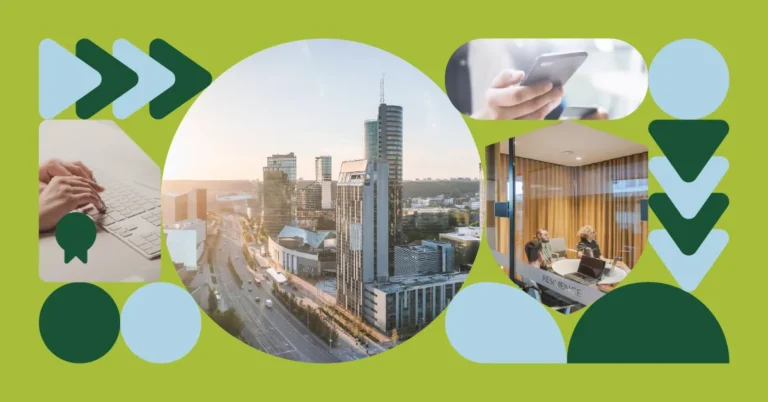Lithuania is establishing itself as a hub for fintech: and it’s doing it very successfully. Up to 10 fintech start-ups were established in Vilnius last year, and currently attempts are being made to attract Swedish investors to establish companies in Lithuania. “We are a young economy. In fact we have a perfect environment for innovative services,” says Mantas Katinas, Director General of Invest Lithuania.
The last global financial crisis was a great shock for the Lithuanian economy, like many others. The country, however, is recovering well, and can be pleased with strong economic growth which is forecast to be 3 per cent this year. This growth is being driven first and foremost by the growth of private consumption and real wages. Large foreign direct investments are fuelling the establishment of new workplaces in the country.
In this way, Sweden is contributing quite significantly to the growth of the Lithuanian economy. According to data from the Cabinet Office, Sweden is the largest foreign investor in Lithuania. So naturally, Lithuania is currently trying to attract fintech investors from Sweden. IBM Global Location Trends rates Lithuania as a country which has a favourable environment for global level investments in the field of financial services.
Easier to obtain a licence
Realtid.se portal was granted an exclusive interview with Mantas Katinas, Director General of the Foreign Investment Promotion Agency Invest Lithuania. At present, Invest Lithuania is actively advertising Lithuania as a perfect country for fintech. According to Mr Katinas, Lithuania has accelerated the process for issuing a licence for banking activity in order to increase the number of start-ups and to attract more foreign capital to the country.
“Licences for payment services and electronic currency transactions are issued in Lithuania in just three months. This is two or three times faster than in other countries. The Central Bank of Lithuania has prepared a “special” banking licence according to which the requirement for minimum capital is one fifth that of usual bank licences. This has created a perfect ecosystem for fintech start-ups, and they are supported in developing their business successfully across the world,” said Mr. Katinas during his conversation with Realtid.se.
Payment system
Companies setting up in Lithuania can also connect to the SEPA-MMS payment system, which is managed by the Central Bank of Lithuania. This system allows business clients and financial companies to transfer money in Euros very expediently and at low costs.
The SEPA-MMS service is part of the EU SEPA initiative. SEPA stands for Single Payment Area, and SEPA-MMS is a single payment area within the Eurozone. The purpose of the system is to facilitate payments made by private individuals, companies and government institutions in countries in the European Union and European Economic Area, and to facilitate their business.
10 fintech start-ups
In the opinion of Mr Katinas, investments into benefits such as access to SEPA-MMS have helped to attract more fintech companies from abroad to Lithuania.
“Altogether 10 foreign fintech companies were established in Lithuania’s capital Vilnius last year. For instance, three are Israeli companies and one Chinese company. Some time earlier Barclays opened an information technology (IT) centre in the city,” he says.
How do Lithuanian fintech companies differ from Swedish companies?
“Sweden has a strong culture of innovation. A lot of local fintech companies which attract foreign capital to the country work there. Meanwhile, Lithuania attracts foreign finance companies. We are a young economy and are attempting to create an environment favourable to innovative services,” Mr Katinas added.
Barclays activity in Vilnius
Barclays and Danske Bank have established the largest “IT laboratories” in Lithuania, where financial technologies are developed and improved. And Invest Lithuania’s Director General has been visiting technology centers in London, Tel Aviv and other financial and innovation centres in order to find out as much as possible to help fintech companies set up in Lithuania.
“Lithuania has an incredible amount of talent in the field of finance and IT. These experts create global-level products of the highest quality. Companies such as Barclays, Nasdaq and Western Union have offices in Vilnius, as do the biggest Scandinavian banks like SEB and Swedbank,” says Mr Katinas.
What do you think the future holds for the development of the fintech sector?
“The finance sector, like the telecommunications sector, has experienced big changes in the last 10–15 years. “Peer-to-peer” companies will become indispensable leaders in the market for offering loans without guarantees, and Google and Facebook will probably propose the best consumption platforms and accumulate gigantic quantities of data,” he forecasts.
Big interest in Sweden
Swedish companies dominate in several sectors of industry in Lithuania. These include the telecommunications companies TeliaSonera and Comviq.
Lithuania’s forestry and wood industries also attract a lot of attention, as they produce products for IKEA. In addition, the Swedish banks SEB, Swedbank and Nordea account for half of the Lithuanian banking sector.
In Lithuania, the Swedish brand is quite strong, and there is a lot of interest in Swedish society and culture.
Student exchange is quite active. About 300 Lithuanian students study at Swedish universities and almost 100 Swedish students study at Lithuanian universities. Studies in Swedish are offered at three universities in Lithuania.
Source: Realtid.se













